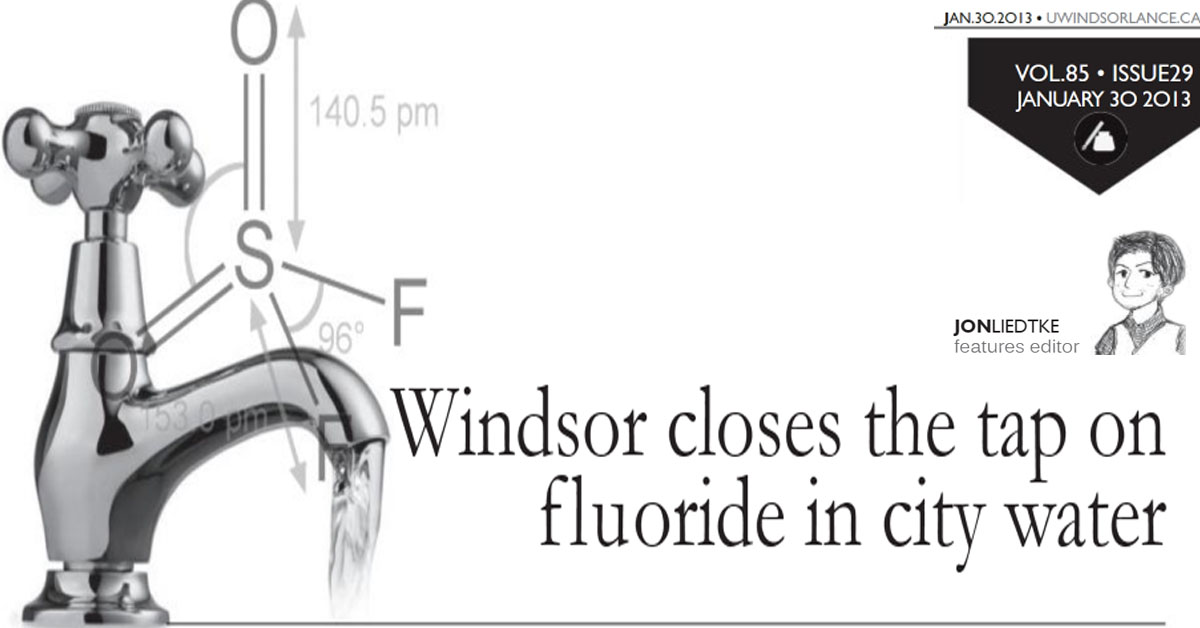UWindsor Lance
Issue 29, Volume 85
Jan. 30, 2013
Jon Liedtke
There’s a battle being waged in Windsor, and it’s over the 55-year fluoridation of the city’s water supply.
One camp of belligerents claim that the other is poisoning the municipality’s water, while the other group counters the claim saying they are enhancing it and providing a much needed service to residents.
A vocal group of opposition to the mandatory fluoridation of water has been making their demands loud and clear over the past year; the complete removal of fluoride from our drinking supply.
Proponents claim that fluoridating water is both safe and effective— at recommended levels— in preventing dental decay and that municipalities are able to protect not only those who have good dental insurance, but those who don ‘t have insurance or access to good dental care.
Opponents of mandatory water fluoridation say adding the substance poses a risk to those who ingest it and that it causes dental fluorosis, a developmental disturbance of dental enamel caused by excessive exposure to high concentrations of fluoride during tooth development. They also say it causes a decrease in bone density and IQ levels.
Following a scathing article written by Windsor Star columnist Anne Jarvis on January 9 in which she socratically assessed the negative claims made by opponents, the Windsor Essex County Health Unit held an emergency public meeting to address the claims Jarvis made.
Timing however was tight. City Council voted 8-3 on Monday night, following six hours of debate, to accept the recommendation of the Windsor Utilities Commission to remove fluoride from Windsor’s water for the next five years and allocate the roughly $130,000 spent on it annually towards education programs.
While the WECHU estimates that replacing fluoridation with a similar service would cost somewhere between $3 million and $11 million annually, such figures are based on providing services to the entire municipality, when in fact many residents
are already covered under dental insurance programs and wouldn’t require additional services.
After noticing marks on her daughter’s teeth and questioning why her daughter’s arm broke following a one-foot drop from a couch, Ayesha Drouillard began looking into the effects of fluoride and discovered that not only do many doctors, dentists and other reputable professionals advocate for the substance’s removal from municipal water, but that the fluoride added to water itself is a byproduct of the phosphate fertilizer industry.
“It’s not naturally occurring, and it’s a byproduct of the phosphate fertilizer industry,” explained Drouillard. She added that while in the past, industry would allow the toxic fluoride gases to escape into the air through smokestacks, but once it was determined to affect surrounding animals and crops negatively, laws were passed to put wet scrubbers in smokestacks to capture the toxic byproduct.
“It’s called hydrofluorosilicic acid and it’s illegal to dump anywhere in the environment [and] would cost industry thousands of dollars per ton to
dispose of it properly and neutralize it,” stated Drouillard. “So they sell it to our municipalities and they add it to our water and they save [and make] money. It’s basically their solution for handling their pollution.”
While Dr. Gary Kirk the associate medical officer of health for the WECHU, during the emergency meeting stated that the fluoride added to our water is a “byproduct of the fertilizer process,” he went on to claim that “not only does it not come from smokestacks” but that “rocks that contain fluoride are put through a chemical process and they produce the type of fluoride that ultimately goes into the water supply. It’s through an evaporation and condensation process, and not through retrieving that fluoride through smokestacks. “
The WUC has conceded that fluoride added to Windsor’s water does indeed come from smokestacks of fertilizer plants, and when asked directly if the fluoride added to the water supply comes from rocks from a fertilizer factory, and as such from smokestacks, Kirk responded, “Yes, absolutely.”
Those who oppose the fluoridation of water are often branded by advocates as conspiracy theorists and Drouillard explained that while initially the media did view her group as such, once the WUC advised the removal of fluoride, public opinion began to change.
“That’s when the newspaper started changing [and] balanced information [was] presented in the articles,” said Drouillard, adding, “It wasn’t just the crazy people and the health people.”
At the core of the issue for many opponents is that municipalities act unilaterally when deciding to add fluoride to the water supply, and as such, democratic choice is removed from the equation.
But Kirk believes that adding fluoride is equitable and that “this trumps individual right. ”
“Choice is the big word here,” commented city Councillor Alan Halberstadt. “By putting fluoride in the water, there’s a lot of people that don’t want it [and] they don’t have a choice when [it’s] put it in our water.”
Halberstadt co-chairs the Windsor Essex Environment Committee, which recommended a year ago to remove fluoride from the water supply because it’s “not only a health issue, but it’s also an environmental issue…fluoride in our water, getting into our streams and into the lakes and rivers.”
“The evidence speaks for itself,” commented Drouillard, “All the medical health officials, their job is to promote artificial water fluoridation they get paid for doing it. Everybody on our side is just doing it because we care about our families and the
environment. “
Windsor closes the tap on fluoride in city water
Issue 29, Volume 85
Jan. 30, 2013
Jon Liedtke
Page 7
Jon Liedtke was the Features and Opinions Editor, Advertising Manager and Deficit Consultant at the UWindsor Lance.




Leave a Reply